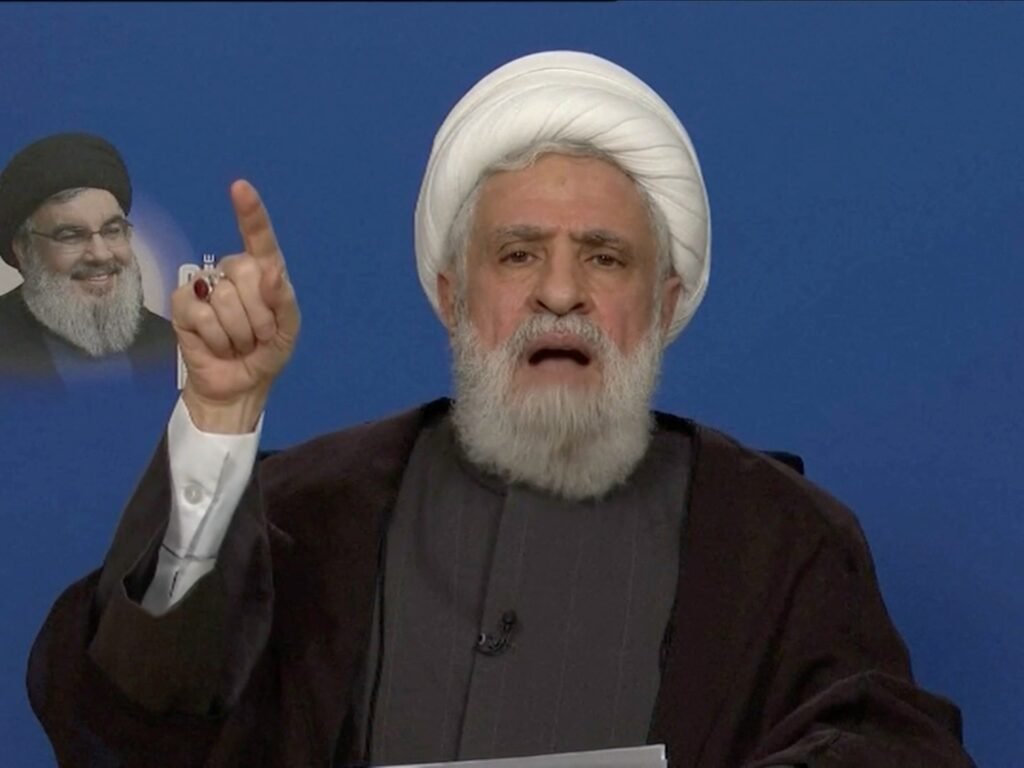Naim Qassem says Saudi Arabia should open a ‘new page’ in relations as pressure on the Lebanese group ‘only benefits Israel’.
Hezbollah’s Secretary-General Naim Qassem has appealed to Saudi Arabia to mend relations with the Lebanese armed group and build a common front against Israel.
The remarks by the Hezbollah chief on Friday come as Israel has launched more attacks on the south of Lebanon.
Recommended Stories
list of 3 items
- list 1 of 3At Doha summit, Qatar’s emir says Israel not interested in ending Gaza war
- list 2 of 3Captured state: Israel 20 years after disengaging from Gaza
- list 3 of 3Israel attacks Qatar: What’s next?
end of list
Qassem urged Saudi Arabia to open a “new page” with Hezbollah, based on three principles: dialogue to resolve disputes and address concerns, recognition that Israel – and not “the resistance” – is the enemy, and “freezing of past disagreements”.
He stressed that the resistance’s weapons are aimed solely at Israel, “not Lebanon, not Saudi Arabia, and not any other place or party in the world”.
Qassem warned that pressure on the resistance only benefits Israel, and that if it were eliminated, “the turn will come for the other states”.
Tensions between Saudi Arabia and Hezbollah have existed for years, and are part of the broader, years-long rivalry between Riyadh and Iran, Hezbollah’s main backer.
The Gulf Cooperation Council (GCC), led by Saudi Arabia, labelled Hezbollah a “terrorist” organisation in 2016, citing its involvement in the Syrian civil war on now-deposed leader Bashar al-Assad’s side and its backing of Yemen’s Houthis.
‘Genocide became solution’
Qassem described Israel as a colonial outpost “backed first by Britain and now by the United States”, and accused it of reaching “the height of barbarity”, committing crimes with full US support and in disregard of international law.
Qassem said “soft war, sanctions, and the Abraham Accords” all failed to deliver the quick and decisive victory the US and Israel sought, “and so, for them, genocide became the solution”.
He added that Israel’s September 9 strike on Qatar marked a turning point, and that “what comes after the strike on Qatar is different from what came before”.
“When the US openly declares that it acts in Israel’s interest, how can we trust any American or non-American proposal, or accept to make concession after concession?” he added.
The US has been pushing Lebanon to disarm Hezbollah under the terms of a ceasefire agreement brokered in November 2024.
Qassem said the group is open to dialogue “from a position of strength”, adding that its commitment to resist Israeli occupation is “unshakable” and aimed at expelling Israeli forces and liberating land.
Qassem’s appeal to Saudi Arabia comes two days after Riyadh and nuclear-armed Pakistan signed a mutual defence pact in light of the Israeli attack on Qatar.
Two killed in Israeli attacks
Separately on Friday, the Lebanese Ministry of Health said two people were killed and 11 others wounded in two separate Israeli strikes in southern Lebanon.
One strike targeted a car outside a public hospital in the town of Tebnin, while another strike hit a vehicle in Ansar.
The Israeli army said it killed Ammar Hayel Qutaybani, alleging he was a Hezbollah commander, in southern Lebanon, without specifying the exact location. It added that it killed a member of the group’s elite Radwan force in Tebnin, and struck “a vessel that was used by Hezbollah to gather intelligence” on Israeli troops in the southern town of Naqura.
The attacks came a day after Israel targeted and bombed several towns in the south and warned residents to evacuate.
Lebanese Prime Minister Nawaf Salam accused Israel of “intimidation and aggressions” committed in defiance of last year’s ceasefire and the internationally backed mechanism to monitor it.
Despite the ceasefire, Israel has continued to strike southern Lebanon on an almost daily basis.
Under the terms of the deal, Hezbollah is supposed to disarm and move north of the Litani River, while Israel is supposed to withdraw fully from Lebanese territory.
However, it remains, occupying at least five points in southern Lebanon.
